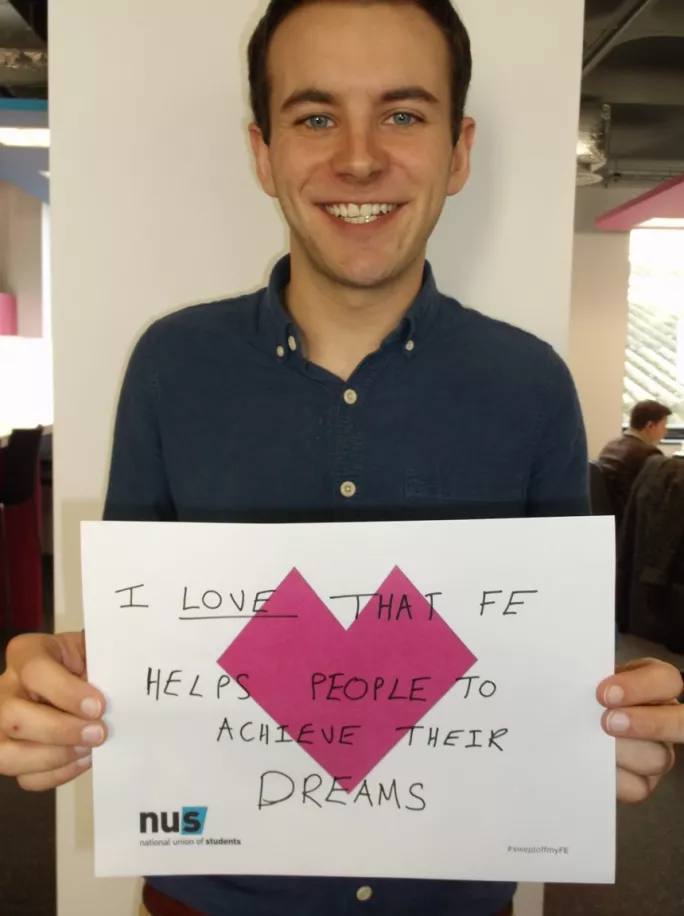NUS vice-president Joe Vinson: This Valentine’s Day show a little love for FE
Joe Vinson, vice president for further education at the National Union of Students, writes:
Valentine’s Day is the day when you tell someone just what they mean to you, or really start to make that relationship better. So today I’m going to share a little love for further education.
And what isn’t to love about the benefits that further education brings to people’s lives? It gives people better life chances. It helps people to become active citizens of the world, exercising their right to vote and participating in their community. And it helps people who haven’t had the best start in life to overcome real disadvantage and make a change for the better.
It just doesn’t get more important than that, really. But the sad fact of the matter is that there isn’t a lot to love about policy that is being rolled out around further education at the moment - things that will break students’ hearts. Some of these will affect students straight away, some won’t have any impacts for a couple of years and some will really target vulnerable learners.
Colleges are in a challenging situation right now in terms of funding and in terms of recognition, and nobody is more affected by this than students themselves. The government’s sustained attacks on our education system do nothing to help young people with the financial practicalities of staying in college and moving onto higher education.
The Education Funding Agency (EFA) has just announced a 17.5 per cent cut to funding for 18-year-old learners in 2014/15. Matthew Hancock, minister for enterprise and skills, has stated that the cut was necessary in order to contribute to the overall public sector deficit.
Doing this denies students important second chances and the opportunity to really consider what they want to do with their lives. There are many reasons why students aged 18 choose to spend an additional year in FE, which include personal trauma, upheaval during their education, a desire or need to change their educational route or simply to attain stronger grades.
Over the past few years, we’ve not just seen attacks on funding. We’ve actually seen attacks on the very fabric of further education, on the very principles and values that make colleges so amazing.
One of these is the proposed reforms to A levels. Under the government’s reforms, the AS level will become a stand-alone qualification.
This will mean that students will need to complete two years of study, with assessment only at the end of Year 13, in order to gain an A level. AS levels will no longer contribute to this qualification.
I’m concerned about this for several reasons. AS levels are currently used as a marker for universities to assess students before offering them a place. There is a fear that this may lead to more entrance tests or an over reliance on GCSE grades. AS levels also provide students with a broader educational experience, allowing them the flexibility to study subjects which they will not necessarily want to take through to a full A level. There is a worry that the removal of the AS-level qualification will marginalise some subjects, especially those which are not viewed as core academic A levels.
Since September, teachers in colleges no longer have to be qualified thanks to the removal of regulations. Qualified teachers are something that college students deserve. I wouldn’t want to be treated by an unqualified doctor, and I wouldn’t want to be taught by an unqualified teacher.
In a summer when the requirement for qualified teachers disappeared, the media narrative was all about academic standards, rigour, and excellence when A-level results day came round once more. If most of the arguments about A-level reform are about the high value placed on qualifications by society and about how qualifications demonstrate ability, skills and knowledge, surely it is hypocritical and illogical not to apply these same values to teachers in FE?
We are doing a lot of work at NUS to devise alternative funding models, to challenge the reforms being made to A levels, to raise the minimum wage for apprentices and getting politicians to invest in further education, to name just a few things.
But what we also need is for students to also start demanding more from our politicians, at a national and local level, when it comes to their education and the support they receive. We’re calling for students’ unions and councils to support their students locally to share the good, bad and ugly of their educational experiences.
It’s clear that I’ve been #sweptoffmyFE, but now we all need to win over the hearts and minds of those who have the power and make things change.
Keep reading for just £1 per month
You've reached your limit of free articles this month. Subscribe for £1 per month for three months and get:
- Unlimited access to all Tes magazine content
- Exclusive subscriber-only stories
- Award-winning email newsletters




